The Health bulletin [serial] - University of North Carolina at Chapel Hill
The Health bulletin [serial] - University of North Carolina at Chapel Hill
The Health bulletin [serial] - University of North Carolina at Chapel Hill
Create successful ePaper yourself
Turn your PDF publications into a flip-book with our unique Google optimized e-Paper software.
Are You<br />
Immunized<br />
Against<br />
'Xockjaw'?<br />
With the advent <strong>of</strong> the spring sea-<br />
son <strong>of</strong> 1967 most <strong>of</strong> us are beginning<br />
to get out <strong>of</strong> doors again. <strong>The</strong>re are<br />
gardens and lawns th<strong>at</strong> need work and<br />
outdoor chores <strong>of</strong> all sorts th<strong>at</strong> have<br />
accumul<strong>at</strong>ed during the winter.<br />
With the return <strong>of</strong> outdoor activities<br />
comes once again the hazard <strong>of</strong> minor<br />
accidents, cuts and scr<strong>at</strong>ches. Most <strong>of</strong>ten<br />
these aren't serious and will heal quick-<br />
ly if properly cleaned and protected.<br />
But sometimes these little scr<strong>at</strong>ches<br />
can be more serious. Sometimes they<br />
are the channel through which you<br />
could get tetanus (lockjaw).<br />
Tetanus-producing spores lie dormant<br />
in the soil <strong>of</strong> your garden, the<br />
dirt <strong>of</strong> your garage, and the dust in-<br />
side your house. <strong>The</strong>se spores can infect<br />
you through the tiniest wound—<br />
pin scr<strong>at</strong>ch, a bee sting or a small cut,<br />
says a pamphlet <strong>of</strong> the American Medi-<br />
a<br />
cal Associ<strong>at</strong>ion.<br />
Tetanus spores may remain in your<br />
body for long periods without producing<br />
the disease. Or, they may produce<br />
poison effects in five to fourteen days,<br />
even though the wound has healed.<br />
First signs <strong>of</strong> tetanus are irritability<br />
and restlessness. Muscles rapidly become<br />
rigid, eventually causing a<br />
clenched-jaw leer th<strong>at</strong> gives tetanus its<br />
nickname— lockjaw.<br />
When symptoms appear, the outlook<br />
is grim, even with the best tre<strong>at</strong>ment.<br />
To avoid the deadly consequences, be<br />
sure you are immunized with tetanus<br />
toxoid. When you are immunized, your<br />
body manufactures antibodies th<strong>at</strong> will<br />
fight tetanus toxin. A booster is needed<br />
every ten years and whenever you<br />
are injured.<br />
If you aren't protected, in an emergency<br />
there is no time for immuniza-<br />
tion. If you have no built-in immunity,<br />
your physician may inject tetanus anti-<br />
toxin. An emergency shot, however, is<br />
not always effective.<br />
Your only long-range guarantee<br />
against tetanus is immuniz<strong>at</strong>ion with<br />
tetanus toxoid. Only one <strong>of</strong> every four<br />
Americans has this protection. Have<br />
you? — American Medical Associ<strong>at</strong>ion.<br />
MEMBERS OF THE NORTH CAROLINA STATE BOARD OF HEALTH<br />
Lenox D. Baker, M.D., President Durham<br />
James S. Raper, M.D., Vice-President Asheville<br />
Ben W. Dawsev, D.V.M.<br />
Gastonia<br />
Samuel G. Koonce, Ph.G. Chadbourn<br />
Oscar S. Goodwin, M.D. Apex<br />
A. P. Cline, Sr., D.D.S. Canton<br />
Joseph S. Hi<strong>at</strong>t, Jr., M.D. Southern Pines<br />
J. M. Lackey Rt. 2, Hiddenlte<br />
Howard Paul Steiger, M.D. Charlotte<br />
EXECUTIVE STAFF<br />
Jacob Koomen, M.D., M.P.H. St<strong>at</strong>e <strong>Health</strong> Director<br />
W. Burns Jones. M.D., M.P.H. Assistant St<strong>at</strong>e <strong>Health</strong> Director<br />
J. M. Jarrett, B.S. j Director, Sanitary Engineering Division<br />
Martin P. Hines, D.V.M. , M.P.H. Director, Epidemiology Division<br />
J. W. R. Norton, M.D., M.P.H. Director, Local <strong>Health</strong> Division<br />
E. A. Pearson, Jr., D.D.S. , M.P.H.<br />
Director, Dental <strong>Health</strong> Division<br />
Lynn G. Maddry, Ph.D., M.S.P.H. Director, Labor<strong>at</strong>ory Division<br />
Ben E<strong>at</strong>on, Jr., A.B., LL.B. Director, Administr<strong>at</strong>ive Services Division<br />
<strong>The</strong>odore D. Srurletis, M.D. Director, Presonal <strong>Health</strong> Division<br />
THE HEALTH BULLETIN March, 1967


![The Health bulletin [serial] - University of North Carolina at Chapel Hill](https://img.yumpu.com/7806875/50/500x640/the-health-bulletin-serial-university-of-north-carolina-at-chapel-hill.jpg)
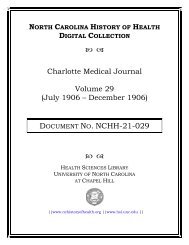
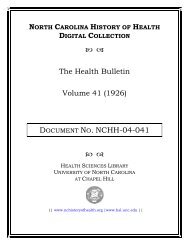
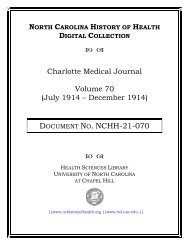
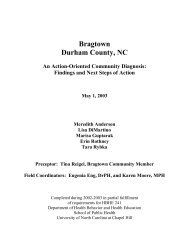
![Bulletin of the North Carolina Board of Health [serial] - University of ...](https://img.yumpu.com/48032016/1/153x260/bulletin-of-the-north-carolina-board-of-health-serial-university-of-.jpg?quality=85)
![The Health bulletin [serial] - University of North Carolina at Chapel Hill](https://img.yumpu.com/47603625/1/169x260/the-health-bulletin-serial-university-of-north-carolina-at-chapel-hill.jpg?quality=85)
![The Health bulletin [serial] - University of North Carolina at Chapel Hill](https://img.yumpu.com/47242858/1/169x260/the-health-bulletin-serial-university-of-north-carolina-at-chapel-hill.jpg?quality=85)
![The Health bulletin [serial] - University of North Carolina at Chapel Hill](https://img.yumpu.com/43204263/1/172x260/the-health-bulletin-serial-university-of-north-carolina-at-chapel-hill.jpg?quality=85)
![The Health bulletin [serial] - University of North Carolina at Chapel Hill](https://img.yumpu.com/41981074/1/163x260/the-health-bulletin-serial-university-of-north-carolina-at-chapel-hill.jpg?quality=85)
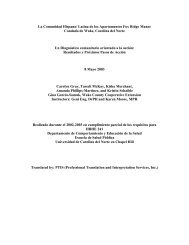
![The Health bulletin [serial] - University of North Carolina at Chapel Hill](https://img.yumpu.com/40912928/1/164x260/the-health-bulletin-serial-university-of-north-carolina-at-chapel-hill.jpg?quality=85)
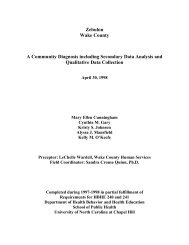
![The Health bulletin [serial] - University of North Carolina at Chapel Hill](https://img.yumpu.com/35643061/1/167x260/the-health-bulletin-serial-university-of-north-carolina-at-chapel-hill.jpg?quality=85)
![Biennial report of the North Carolina State Board of Health [serial]](https://img.yumpu.com/34024350/1/166x260/biennial-report-of-the-north-carolina-state-board-of-health-serial.jpg?quality=85)
